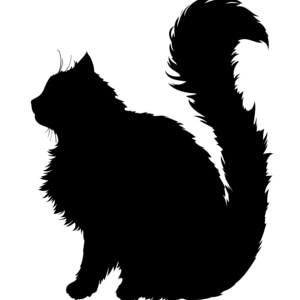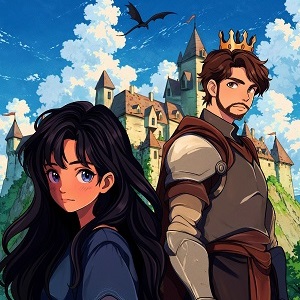A knock interrupted my discussion with Gilly, and I found Genevieve at the door, ready to go to town. She seemed kind of excited about our venture.
“I don’t go into the town on my own very often,” she confessed as we headed down the hall, a disapproving Olwen trailing behind. “Arthur did request that we take a knight or two, but this is different, usually I just send someone into town for me. This is exciting! I’m quite interested in seeing Camelot up close myself.”
I raised an eyebrow, wondering how she had spent so much time here and yet apparently rarely saw the majority of the city. “He expects people in the town to harm you?”
“Well, not exactly. It’s more a matter of people trying to rob someone with money, and of course we have to bring money if we are shopping. He doesn’t think most people would intentionally bother the queen, or the queen to be, but it’s also a matter of safety. One must safeguard the future of the kingdom, and that does include the royals.” Her brows furrowed a bit. “Although I’d personally hope that the people of the town would like me enough I wouldn’t have to worry about stuff like that.”
I heard Olwen mutter something about ruffians, but Genevieve didn’t hear her and I ignored her.
“Is crime common here? People are starving? In need of resources?” That didn’t seem like a good thing on Arthur’s record if so.
“Oh no!” Genevieve was quite taken aback, almost horrified by this suggestion. “There are always struggles, of course, but Camelot is one of the wealthiest towns in the kingdom, since the king lives here. People here rarely struggle for food or other resources. In fact, any time we serve meals for the nobles or hosts feasts – which occurs quite regularly – we have food left over. Sometimes on normal days we do, too. It’s considered extremely inhospitable for a king to not have enough food for a meal, so by default, we make too much instead. Sometimes far too much. Of course all the servants get to eat it, too, and bring some home to their families in town, but there’s still usually extra because that’s accounted for in making the food to begin with. I’ve noticed the problem for ages, but I wasn’t in a position to do anything about it. Uther had ordered me educated in the role of a queen, but refused to give me any authority to begin to take on the role, including helping run the house, so I had to wait until I was allowed before I could try to stop some of the waste.”
She waited at the door as a guard immediately stepped forward to open it for us. “So when Arthur took the throne, his first order of business was to start recruiting women as mages and knights. Mine, however, was to take over the household accounts. It’s a rather tedious job at times, going over the ledgers, making sure we aren’t being wasteful. For all his faults, though, I will say that Uther was quite frugal about most things. He could be very lavish with parties, but apart from that, his steward – who took over after the queen died – managed the castle quite well.
“You see,” she explained as we turned towards the knights’ quarters, “of course I could take the leftovers and offer them to townsfolk. I arranged to have a stall in the market where any leftover food could be brought, to ensure that it would be available to anyone who needs it. Now, like I said, Camelot is quite well off for the most part, so most of these people are not lacking for food, but in case any are, we have extra.” She looked thoughtful. “But I want to do more. I want to arrange programs to send food or provide regular food services to other towns, especially anywhere we know routinely have problems with lack of resources. The castle will send bulk supplies at times, but I want something more regular. Perhaps bread to all the regions, hiring local bakers to just make a few extra loaves each day, enough to donate to the poor. I haven’t figured out the details yet, or how to fund it. I’m still looking over the ledgers to figure out how to make it work.”
By context, then, she seemed to think lack of food was the primary reason for crime. “So people here don’t go hungry, where they might in other towns or villages, but what about crime generally?”
She seemed a bit puzzled. “You mean crime for no reason?”
I wouldn’t call it that. I’d call it “life close to others.” Affairs, jealousy, coveting things other people had. In some ways, the townsfolk of Camelot might be resentful that while they had more than their more remote counterparts, they didn’t have the finery that the nobles had – nobles who lived mere meters from them.
But crime and the like was probably more Arthur’s domain than hers, so perhaps it wasn’t a surprise that she wasn’t entirely aware of whether people robbed visitors to town on a regular basis – just for money, not for food.
Olwen muttered something again about inappropriate topics of conversation and wondering why this was something her ladyship should ever consider, but as we had just entered the courtyard where the knights were, Genevieve didn’t hear her.
“We should find a couple of knights who are free and can help.” She looked around, almost hesitant. “Or is it rude to interrupt their training?”
Ah. She had implied she wasn’t good at confrontation, but this wasn’t even that. This was marching up to someone to find out if they could accompany her to town. Maybe a boring job for a knight, I had no idea, but considering that they were sworn to protect the throne and the royal family, protecting her as the future queen was important to them.
I spotted the tall female knight I’d noticed the other day, so I not-so-subtly nudged Genevieve in her direction. “Shall I ask her, or will you?”
Genevieve took a deep breath. “No, I will. I – I need to be used to giving orders.”
She took a couple of firm steps forward, but when the lady knight turned around and spotted her, all the wind seemed to go out of her sails.
“Are you perhaps free?” She asked, timidly. “We need an escort into town.”
Olwen started making a tsking sound and moved to step forward, but I slid my foot out, blocking her path, and gave her a sideways warning look . She might not realize it, but Genevieve needed to learn how to approach knights, people who were predisposed to be on her side, if she really wanted to be the queen she intended.
Olwen might have caused a scene in another context, but here, in front of the knights, she couldn’t kick up a fuss about me stopping her. She glared, she muttered under her breath, but she didn’t push me aside.
Meanwhile, the lady knight blinked for a second, then bowed her head slightly, if a little awkwardly herself. “My Lady. I would be honored to provide you an escort into town.”
“Oh.” Genevieve almost sagged with relief, but still managed to hold her posture, a smile breaking out on her face instead. “That would be lovely. Do you know if anyone else is free? Arthur suggested we take two knights, one for me, and one for his ward.” She motioned to me, then belatedly realized we didn’t know each other.
“Oh! My apologies. Merlynn, this is Sir Ancelote, one of Arthur’s knights.” She smiled at the tall knight, then back at me. “Sir Ancelote, this is Merlynn, Arthur’s ward.”
She eyed me, raising one eyebrow, but didn’t make a comment on my plain dress, unstyled – although tangle-free – hair, or lack of shoes. “My Lady,” she said, bowing her head to me, too.
I nearly snorted. “No. No, none of that. I am no lady. Merlynn is fine.”
She blinked at me, her intense eyes curious, then seemed to remember that Genevieve had asked her a question. “Allow me to get another knight to join us. We can meet you at the gate, or if you are prepared to leave now, we can accompany you immediately.”
“We’re ready now!” Genevieve seemed pleased with herself that she could say this. “Oh, I suppose I should tell you, my lady-in-waiting has the purse.”
Olwen was carrying a bag that looked rather heavy and I had to assume had money in it. It was probably useful for the knights to know who had the money and who was most likely to be targeted by any potential pickpockets or robbers.
Ancelote recruited a young-looking knight who seemed extremely nervous initially. Then I realized he was only nervous around Olwen, who kept glaring at him, but he seemed fine enough around Genevieve and me.
As we started our walk out the gate, down the hill, and towards the town proper, I fell into step with Lanval, the young knight, my eyes going to a band at his wrist.
“Ellyllon made,” I observed out loud, but not loud enough for Genevieve and Ancelot, who were in front, or Olwen, who was walking behind them, to hear. “Are you friends with an ellyll?”
He startled, then flushed deeply, briefly attempting to hide his wrist before realizing it was pointless. “I grew up near ellyllon woods,” he explained in a soft, surprisingly gentle voice. “One of the ellyllon made this for me.”
“A lady?” I asked. The band was delicately made, which could have been either a male or female ellyllon, but something told me this was a lady, not a man.
He hesitated, then nodded. “I’m a commoner. I grew up in Celliwig. It used to be well-known as a city where ellyllon and humans both lived, until Uther became king. The ellyllon of Celliwig, being a very known population, were almost an immediate target. Most of the ellyllon retreated into the forests, where it was difficult even for trained knights and soldiers to find them. But,” he said slowly, a slightly nervous glance at Olwen ahead of us, “those of us from the town, still know they’re there. We still see them as part of Celliwig. Or, well, most of us do, at least. I’m not the only child who grew up running into the woods to find ellyllon friends. They didn’t always trust us, afraid that we might turn them over to the king, but in time, fewer and fewer of his people came and he eventually forgot that the ellyllon of Celliwig were worth pursuing. They’re still cautious, but they mingle with us townsfolk fairly regularly.”
That explained why he was friends with an ellyllon, but it didn’t explain why one had woven him a band.
He went on, though. “We had planned marriage,” he admitted softly. “But then Arthur convinced Uther to allow commoners to become knights. And I – I saw a chance to do more than I could in the village. I saw a chance to help my family. My father is bedridden and my mother often struggles to feed them both, but a knight’s salary meant I could afford to care for them both, with ease. I also thought that as a knight, I might have a better chance of warning the ellyllon if ever Uther again targeted them.”
He seemed alarmed suddenly, as if realizing he’d basically just admitted that he’d plotted against the king’s orders.
I waved my hand carelessly before he could panic too much. “I am no fan of Uther and given that I am not fond of Arthur, either, I am not about to run off and tell him you disagreed with his father’s policies on Arcane – something that he supposedly agrees with.”
He glanced at me sharply. “You don’t think he’s serious? When he became king, and he told us he hoped for a better life for Arcane, I wrote to her, telling her such, and suggested maybe she could consider coming here if she still wished to marry me. She understood about why I’d become a knight, that it was a way for me to care for my parents and even protect her people at the same time, but now I dared hope for more. Only…marrying a knight is no easy commitment, and for an ellyll to consider coming to Camelot, of all places, was far too dangerous for her under Uther’s reign, and she still fears even now. Arthur’s words haven’t convinced her.”
I shrugged. “I don’t know. He says it, Genevieve believes it. But I have yet to see it, and I suspect that is holding your ellyll back, too.”
I knew the fears that she’d have, being an Arcane mere steps away from the king’s court. Ellyllon didn’t have the kind of magic I did – no one but my own kind did – and while they were strong in their own right, their strength tended to come in numbers. Their magic would intertwine with that of their fellow ellyllon until it created a nearly impassible wall that few things could counter. Similarly, combined magic could be devastating in war.
Huh. I’d heard Arthur worrying about how he could protect the entire country. Maybe he was ignoring a potential resource and a potential way to mend the harms his father had done.
A pity he didn’t realize it.












Comments (8)
See all